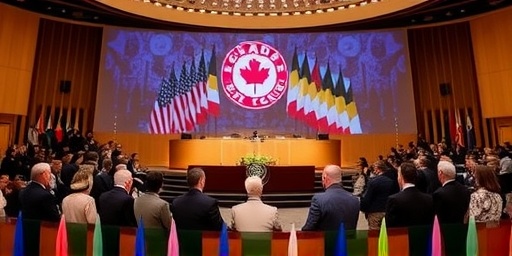Belém, Brazil – Health advocates and environmental organizations unleashed scathing criticism of the COP30 summit’s final agreements on Monday, labeling them a devastating blow to public health in the escalating climate change crisis. With nations failing to deliver ambitious emission cuts or firm timelines for phasing out fossil fuels, experts warn of surging heat-related illnesses, infectious disease outbreaks, and air quality disasters that could claim millions of lives by 2050.
- Health Advocates Highlight Deadly Public Health Risks from COP30 Shortfalls
- Canada’s Climate Rollback Ignites International Fury at COP30
- Environmental Groups Expose Gaps in COP30’s Fossil Fuel Phase-Out Promises
- Scientific Consensus Links COP30 Failures to Surging Global Health Emergencies
- Post-COP30 Momentum Builds for Ambitious Reforms and Accountability
The two-week UN COP30 conference, hosted in the Amazonian city of Belém, ended with non-binding national commitments that fall woefully short of the 1.5°C warming threshold, according to analysis from the Climate Action Tracker. “This is not ambition; it’s abdication,” declared Dr. Elena Vasquez, executive director of Health Without Harm, a global coalition. “Climate change is already the biggest threat to public health, and COP30 just handed polluters a free pass.”
Health Advocates Highlight Deadly Public Health Risks from COP30 Shortfalls
Representatives from over 200 health-focused NGOs gathered outside the summit venue on the final day, brandishing reports that tie COP30‘s tepid outcomes directly to human suffering. The World Health Organization (WHO) estimates that climate change currently causes 250,000 additional deaths annually from malnutrition, malaria, diarrhea, and heat stress alone. Projections shared at COP30 suggest these figures could double if global warming exceeds 2°C.
“Vector-borne diseases like dengue and Zika are exploding in new regions due to warmer temperatures,” explained Dr. Raj Patel, a tropical medicine specialist with Médecins Sans Frontières. “Without aggressive climate action from COP30, we’re looking at 700 million more cases of malaria by 2030 in previously unaffected areas.”
Air pollution, exacerbated by fossil fuel dependency, was another flashpoint. The summit saw no breakthroughs on methane reductions from oil and gas operations, despite evidence linking them to 8 million premature deaths yearly, per a 2024 Lancet study. Activists projected stark visuals: maps showing ozone hotspots overlapping urban centers, with children and the elderly hit hardest.
- Heatwaves: 2024’s record summers killed 61,000 in Europe; COP30 inaction could see such events 5.6 times more frequent by 2100.
- Food insecurity: Droughts linked to climate change threaten 183 million more people with hunger by 2050.
- Mental health: Eco-anxiety and disaster trauma already affect 45% of youth globally, per recent polls.
These statistics formed the backbone of a joint declaration signed by 150 organizations, demanding health be elevated as a core pillar of future climate talks.
Canada’s Climate Rollback Ignites International Fury at COP30
Canada emerged as the lightning rod for outrage, accused of regressing on its environment commitments amid domestic oil lobby pressures. Environment Minister Steven Guilbeault faced heckling during his closing speech after announcing a delay in the oil sands emissions cap and expanded LNG export approvals.
“Canada came to COP30 with one hand extended for praise and the other clutching Big Oil’s agenda,” fumed Greta Thunberg, who joined protesters. “This betrayal undermines public health everywhere by prolonging fossil fuel addiction.”
Under Prime Minister’s latest policy shift, Canada‘s Nationally Determined Contribution (NDC) now projects emissions rising 15% by 2030 from 2020 levels, inverting prior reductions. Critics point to tar sands expansion in Alberta, where extraction emits 70 megatons of CO2 yearly – equivalent to Australia’s total output.
Indigenous leaders from the Cree and Dene nations amplified the backlash. “Our lands are poisoned, our waters toxic. Canada‘s COP30 stance is genocidal for future generations,” stated Chief Wilfred King of the Mathias Colomb Cree Nation.
Internationally, Brazil’s President Lula da Silva subtly rebuked Ottawa, noting, “True climate leadership doesn’t expand what it vows to end.” Small island states, like those from the Pacific, threatened to walk out of future talks if Canada doesn’t reverse course.
Environmental Groups Expose Gaps in COP30’s Fossil Fuel Phase-Out Promises
Beyond Canada, the COP30 text drew fire for its ambiguous language on fossil fuels. While acknowledging the need for a “transition away,” it omitted enforceable deadlines, allowing loopholes for “transitional fuels” like natural gas.
Greenpeace’s International Executive Director, Inger Andersen, called it “greenwashing on steroids.” “The environment is collapsing – wildfires ravaged 18 million hectares in 2024 – yet COP30 prioritizes profits over planet.”
Financial pledges fared no better. The much-touted Loss and Damage Fund received $500 million in new commitments, a fraction of the $400 billion annually needed by vulnerable nations. Adaptation funding for public health infrastructure, such as resilient hospitals and early-warning systems, totaled under $10 billion.
- Summit highlighted successes in nature-based solutions, like Amazon protection, but critics say it’s a distraction from emissions core.
- China and India defended coal reliance, citing development rights, stalling global consensus.
- Private sector pledges from tech giants promised $100 billion in green tech, but lacked verification mechanisms.
350.org’s report card gave COP30 a D-, the lowest since Paris 2015, warning of irreversible tipping points like permafrost thaw releasing methane bombs.
Scientific Consensus Links COP30 Failures to Surging Global Health Emergencies
Delegates heard dire testimonies from scientists throughout COP30. Dr. Friederike Otto, of Imperial College London, presented attribution studies showing climate change made 2024’s Hurricane Milton 10% more intense, displacing 1 million and straining Florida’s health systems.
In Africa, where 600 million lack electricity, climate-fueled floods in Nigeria killed 1,500 last year, overwhelming cholera-vulnerable populations. “COP30 ignored these realities,” said Prof. Joyashree Roy, IPCC author.
Public health experts advocated for “health in all policies,” integrating metrics like Disability-Adjusted Life Years (DALYs) into NDCs. A new study in The Lancet Planetary Health revealed climate change could shave 10% off global GDP by 2050 via health costs alone – $23 trillion.
Women and children bear 80% of the burden, per UN Women, with maternal mortality rising 20% in heat-stressed regions.
Post-COP30 Momentum Builds for Ambitious Reforms and Accountability
As delegates disperse, advocates are pivoting to enforcement. The Health-Climate Alliance plans lawsuits against high emitters, targeting Canada‘s policies under domestic law. “We’ll hold governments accountable in courts if not conference halls,” vowed Alliance co-chair Dr. Vasquez.
Next year’s COP31 in Australia offers a redemption arc, with calls for binding health safeguards and a fossil fuel end-date. Nationally, Canada faces mounting pressure: polls show 68% of Canadians support stricter oil regulations, fueling potential 2025 election shifts.
Grassroots innovations shine hope – community solar in Brazil cut emissions 30% while improving respiratory health, scalable globally. Investors, managing $130 trillion, signal divestment from non-compliant firms post-COP30.
The path ahead demands vigilance. With 2025’s NDC updates due, experts urge embedding public health as non-negotiable. “COP30 was a stumble, not a fall,” noted UN Climate Chief Simon Stiell. “But the clock to 1.5°C is merciless – act now or pay forever.”








